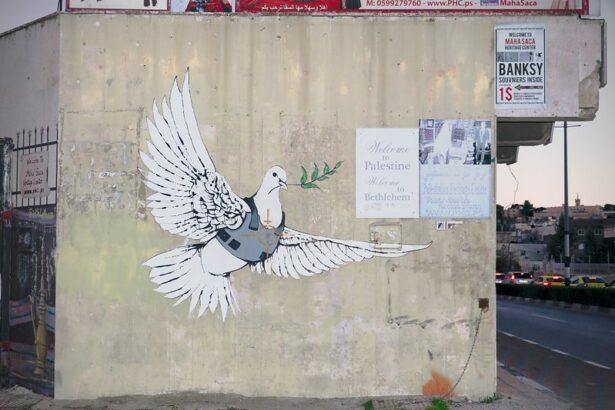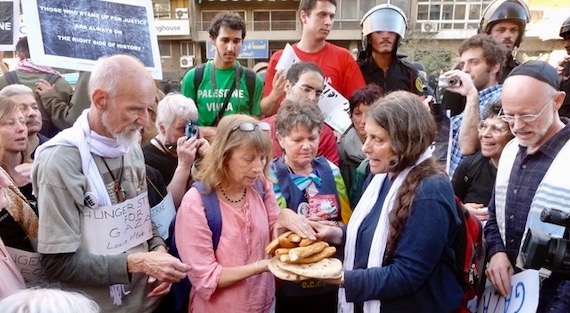As a rabbi committed to the practice of Jewish nonviolence, I know a long road of reparative action stretches before us. But it’s the only way.
( Waging Nonviolence ) – In an article entitled “What does Jewish law say about the war between Israel and Hamas,” Jay Michaelson explores biblical, talmudic and medieval sources to answer that question, noting the long arc of rabbinic tradition bends toward nonviolence. In Jewish life, the normative perception of Torah is that it was given to protect its weakest individuals as the powerful do not need protection.
I am a Shomeret Shalom rabbi, which means I accept this traditional view of Judaism and have adopted a contemporary practice of Jewish nonviolence in solidarity with frontline practitioners of civilian nonviolent struggles. I do not claim the Jewish legacy of nonviolence is the most authentic expression of Judaism since there are and have been many kinds of Judaism.
In this historical period, many Jewish people subscribe to secular and religious Zionism, a form of institutional Judaism which has deployed militarism to operationalize its stated political goal of a permanent Jewish demographic majority in a Jewish state. Based on the idea that Jews must possess the power of a fully militarized nation state to defend their lives against the forces of antisemitism — especially when it is institutionalized in state power — Jews forcibly expelled Palestinians from their historic homeland and have disenfranchised those who remain. Absolute denial of the human rights of Palestinians has been a central pillar of both Christian and Jewish Zionism for the past 75 years. Jewish Zionism is irrevocably tied to Christian Zionism’s white supremacist, profoundly antisemitic, Islamophobic and colonial settler worldview and is formational in the creation of Jewish statehood.
In this catastrophic historic moment, the full force of the 1948 nakba is being repeated. The mass expulsion of hundreds of thousands of Palestinians from their refugee homes is taking place in the midst of a campaign of mass killing with absolutely no regard for civilian life. The state of Israel — with the support of the United States — is forcing an entire nation to flee on foot without food or water or medical care, with no destination. It is possible, perhaps likely, that Palestinians will not be allowed to return, especially since entire neighborhoods have been destroyed. An Israeli ground invasion will take hundreds, if not thousands, of lives and most likely the lives of the hostages. In addition Palestinian residents of the West Bank are under constant siege while all eyes are turned toward Gaza.
The vast majority of adherents to Christian and Jewish Zionism effectively denied Palestinians any form of freedom struggle for the past 100 years. The thousands of Palestinians who have struggled nonviolently for an end to Israeli military occupation — and the right of return for the better part of a century — have been brutally betrayed by U.S. and European communities and states completely rejecting the Palestinian demand for justice due, in part, to their own guilt over the genocide of Jewish people during World War II. Innocent Palestinians are carrying the burden of centuries of antisemitism.
In mainstream U.S. Jewish communities, the only acceptable ways of relating to Palestinians has been a modicum of humanitarian aid, some acts of accompaniment during olive harvests, and lukewarm receptivity to the Parents Circle (formerly the Bereaved Parents Forum), composed of both Jewish, Israeli and Palestinian victims of deadly harm. Robustly pursuing equitable and just political solutions aimed at dismantling occupation and apartheid and instituting the right of return have been labeled outside the boundaries of permissible action and often dubbed “antisemitic” as a silencing tactic. The major nonviolent tactic used by the Palestinian community — boycott, divestment and sanctions, or BDS — has been criminalized in the laws of more than 30 U.S. states and is a widely accepted point of view.
Rabbi Lynn Gottlieb (center right) holds the “Bread of Freedom” during the Gaza Freedom March in 2009.
When freedom is long denied, when nonviolent tactics are rejected and criminalized, when an entire people is dehumanized, some sectors of that society will inevitably deploy extreme violence to end a ferociously brutal 75-year rule. The hubris of privilege is a state of mind in deep denial of the humanity of the other except as pitiable victims or vicious terrorists. This is a deeply distorted, wrong and dangerous point of view.
In the aftermath of Hamas’ war crimes against Israeli civilians — including the murder of entire Jewish Israeli families, Palestinians who hold Israeli citizenship, refugees from Africa and workers from the Philippines and Southeast Asia — many people are further hardening their hearts to Palestinian suffering, opening the way for genocidal actions. The most right wing and corrupt Israeli government in its brief history seems to be crafting a future of permanent open air prisons for Palestinians. The people of the Holocaust are using the language of holocaust to justify acts of genocidal carnage.
Comparing Palestinians to animals and Nazis is a narrative used to justify erasing Gaza from the earth. Dehumanizing language is, by now, deeply entrenched in the way Jewish people have talked about Palestinian people for seven decades. The silent majority of Jewish community leaders who have refused to speak out against Palestinian oppression for fear of either being fired, dividing their communities or losing their funding, have fueled Israeli impunity and made possible ongoing repression of Palestinian people.
Three quarters of a century of active nakba against Palestinians has resulted in the institutionalization of Israeli policies of collective punishment, denial of basic needs like housing, food, water and freedom of movement and continuous humiliation and assault on Palestinian persons. All this is well documented by B’Tselem, Human Rights Watch, Amnesty International and of course, by Palestinians living under Israeli rule. This is systemic violence, and we cannot stand idly by.
We should reject the current narratives that compare the atrocities inflicted on Israelis living in the south as equivalent to the Holocaust. The “never again” narrative is being deployed to justify Israel’s right to defend itself by committing atrocity after atrocity against an entire population. And the belief that Jewish safety depends on a policy of “by any means necessary” is not accepted by all Holocaust survivors, much less all Jewish people.
Over the years, while leading interfaith peacebuilder delegations to Palestine, I would encounter an elder Holocaust survivor named Anna Columba protesting with Women in Black in Zion Square in Jerusalem. When I see her, I ask her the same question I’ve asked her before, “Anna, why do you come here?” She gives me the same answer: “I lost my whole family in the Holocaust. The Nazis were murderers. I don’t want us to be like them. Better to be among the persecuted than the persecutors, because at least, we still have our human souls.”

The Judaism I choose to practice, Shomeret Shalom, is shaped by Jewish nonviolent traditions and legacies in dialogue with contemporary practitioners of nonviolent direct action, especially those directly impacted by systemic violence and militarism. For me, nonviolence is not just a tactic, it is a way of life I choose to live by, day after day. I learned how to struggle nonviolently in this arena from Zoughbi Alzoughbi of Wi’am: The Palestinian Conflict Transformation Center, George S. Rishmawi of Abraham Path, Sami Awad of Holy Land Trust, Hisham Sharabati of Al-Haq, and countless other Palestinians who have struggled to institutionalize hope in their communities.
As a Shomeret Shalom rabbi, the first step toward repair for the sins of Zionism, in my view, is to accept accountability for our part in the murderous tragedy of this moment and to take action steps to build a movement of resistance and solidarity with other Palestine solidarity activists. Now, the demand is for an immediate ceasefire and humanitarian aid. However, we have to hold fast to building the boycott, divestment and sanctions movement. BDS is still very much on the table and needs to be valued, supported and expanded as the central liberation tactic until the right of return is made real.
For people wondering what actions to take in addition to non-stop calling of federal and state representatives, members of Congress and the White House for an immediate ceasefire, we have to use this moment to build support for forces like Zochrot and B’Tselem within Israeli society that are working for equity, dignity and the Palestinian right to return to a single commonwealth of Jews and Palestinians, as citizens with equal rights under the law. In addition, Palestinian-led organizations like the BDS National Committee — which is composed of over 80 civic organizations — Holy Land Trust, Wi’am and so many others have decades of experience that can guide movement strategies and tactics.
In the midst of grief over so much loss of life, I am committed to nonviolent direct action. I am ready to declare that Zionism is a failed movement for Jewish liberation and should be considered muktzeh, that is, outside the bounds of what is acceptable Judaism. A long, long road of teshuvah, the Jewish system of reparative action, stretches before us. We cannot walk it alone, but we must walk this path nonetheless. The only path forward — toward a world that is safe for Palestinians and Jews — is solidarity to loving justice. I choose to put my faith in the idea that our liberation as human beings is interdependent. All of us or none of us. For the sake of our children.
This is not the first generation to struggle with the overwhelming task of facing injustice. Rabbinic ancestors facing Roman occupation were fond of the following quote to encourage people to take action in spite of overwhelming circumstances:
“The urgency to relieve suffering lives in us;
The task is overwhelming.
No one of us can fix it all,
Neither are we permitted to desist from trying.”




 © 2025 All Rights Reserved
© 2025 All Rights Reserved